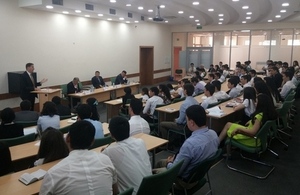British Ambassador tells Uzbek students about the Magna Carta
British Ambassador delivers a presentation at the Tashkent State University of Law.

British Ambassador delivers a presentation at the Tashkent State University of Law
On 5 May 2015, Her Majesty’s Ambassador George Edgar visited the Tashkent State University of Law, where he delivered a presentation ‘The Magna Carta and the British Constitutional system” that was attended by TSUL students and academic staff. Dr. Akmal Saidov, Director of the National Human Rights Centre of Uzbekistan, was among the guests invited to attend the lecture.
15 June 2015 marks the 800th anniversary of the sealing at Runnymede, by the river Thames, of an agreement between king John of England and his barons – landowners and military leaders – that became known as the Magna Carta, or Great Charter.
Ambassador Edgar spoke about the role of the Magna Carta in the development of the rule of law in England and subsequently the United Kingdom, as a document embodying the idea that even the King must act in line with the law, and that nobody may be subjected to punishment except for a specific offence against the law, and following a proper trial.
Ambassador Edgar noted that those ideas were developed over the centuries and are at the basis of today’s conceptions of access to justice, of individual rights, and of the supremacy of parliament. Ambassador Edgar quoted the great British jurist Lord Denning, who described the Magna Carta as “the foundation of the freedom of the individual against the arbitrary authority of the despot”.
Dr. Akmal Saidov, Director of the National Human Rights Centre of Uzbekistan, also spoke about the importance of the Magna Carta. He underlined the historical importance of the Magna Carta and its enormous impact on the development of parliamentarism and national constitutions worldwide, as well as international human rights instruments adopted in the 20th century.